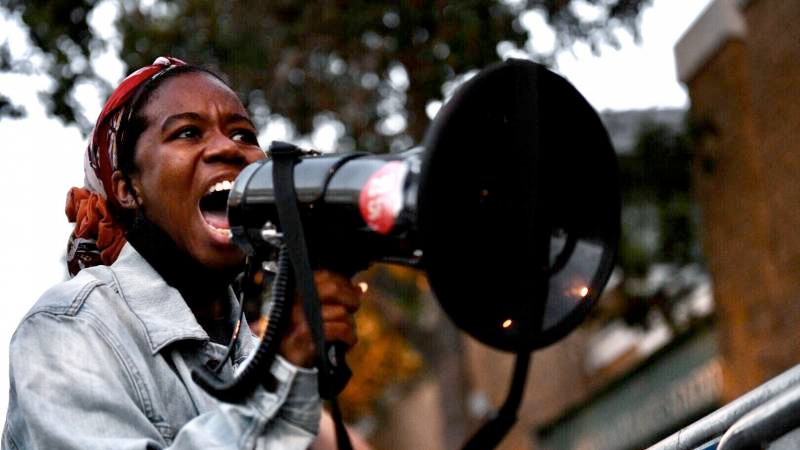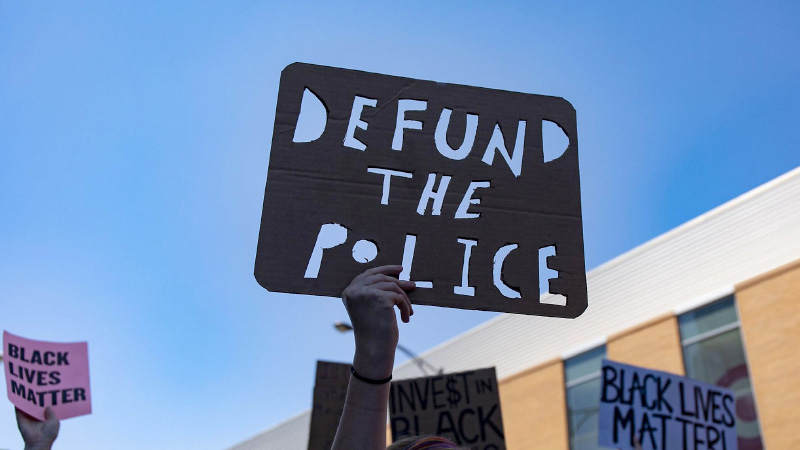The San Francisco Board of Supervisors approved a city budget last week that failed to meaningfully defund the San Francisco Police Department (SFPD).
The decision came after months of agitation—flyer posting, packing meetings for public comment, and street demonstrations—by the Defund SFPD Now campaign, a group calling for immediate cuts of nearly $300 million to the police budget. Defund SFPD Now is led by the San Francisco Afrosocialists & Socialists of Color Caucus in collaboration with the Justice Committee of the Democratic Socialists of America (DSA) San Francisco chapter.

The supervisors claim that the budget “took $120 million from the police department and the sheriff’s office and invested it in resources for the Black community.” But that is not an honest way to talk about the numbers. The 2020-2021 San Francisco Police Department (SFPD) budget is about $648 million. That figure is only about $44 million less than the 2019-2020 budget. Even so, this six percent reduction in police funding amounts to the deepest cut to a big city police department budget anywhere in California this year.
Throughout California, the country, and the world, social uprisings took place this summer in response to the racist police murders of George Floyd, Breonna Taylor, Tony McDade, and others. Demands that had been made for years by abolitionists to “defund the police” traveled from the margins to the center of public discourse in a few weeks.
This change in discourse, however, has only had meagre effects on police budgets. It was widely reported that the City of Los Angeles cut $150 million from police funding this summer, but those reports also misrepresented the reality. The 2020-2021 Los Angeles Police Department budget is $1.7 billion, about the same as it was in the previous fiscal year. The recent San Diego city budget actually increased police funding. In San Jose, the police department budget was cut by $15 million, but police funding still increased as a proportion of the total city budget.
Looking at the whole country, Bloomberg CityLab analyzed 34 of the largest 50 cities with finalized budgets.They found that “the difference between police spending as a share of the general funds fell less than 1 percent from last year.” It is remarkable that cuts to SFPD are the deepest in California, and perhaps among the deepest in the entire country, not because of where they are happening, but because they are so shallow.

Alex Karim, a Defund SFPD Now organizer, spoke about the budget vote with Tempest. “The SFPD budget was only cut six percent and doesn’t fire any officers, so the lived reality for folks who interact with police on a daily basis will not materially change,” she said. “It is critical that the [board of supervisors] recognize that these interactions are dangerous and that they have a responsibility to defund and abolish SFPD to protect their constituents.”
The supervisors approved the budget with ten votes to one. Supervisor Catherine Stefani cast the only opposing vote, but she did so from the right. Stefani, who represents a district in wealthy north-central San Francisco, did not want to approve funding for raises for unionized city workers that had already been agreed to through collective bargaining.
Another supervisor, tenant advocate and DSA member Dean Preston had signaled that he would oppose such a budget from the left. He had met with the Defund SFPD Now campaign and assured them that he would oppose any budget that did not compel SFPD to layoff officers. Despite this, he cast his vote for the budget.
The campaign challenged Preston from their Twitter account after the budget vote. “Supervisor Dean Preston, on August 10, you told us you would reject any budget that does not fire police officers”, they wrote. “Today, you voted for a budget that does not fire police officers. What happened?” Preston responded, claiming that he “[does not] remember making that commitment in our conversation.” The campaign account has since replied, “We have meticulous meeting notes with timestamps and version history in which you unambiguously state that you will vote no on a budget that does not fire officers. It’s disappointing that this commitment wasn’t important enough for you to remember.”
Preston is not the only Bay Area socialist in local government to support a city budget that does not meaningfully defund the police. Another DSA member, Oakland City Council President Rebecca Kaplan, joined centrist council members in June to support a budget that keeps police funding at the same level as the previous fiscal year, about $318 million.
Facing criticism in the aftermath, Council President Kaplan conceded to demands to revisit the police budget the next month. But when it came up again in July, Mayor Libby Schaaf broke a tie vote to reject a proposal for further cuts of $2.75 million. By that point, Kaplan was supporting a proposal for $10 million of further budget cuts, but the left-liberals on the council had already been outmaneuvered by the centrists.
The city council did make a unanimous decision in July to work on a plan to cut the Oakland Police Department budget in half over the course of two years between 2021 and 2023. However, the adage “a bird in the hand is worth two in the bush” applies here. It would have been better to secure some defunding this summer when the social movement was surging than to invest our hopes in a city council planning process.
The votes by Preston and Kaplan in favor of budgets that fail to meaningfully defund the police raise serious concerns about how DSA chooses its candidates, and how and whether we can hold them accountable. Preston is a DSA member and he was endorsed by DSA San Francisco. Kaplan, on the other hand, is a DSA member, but she has not been endorsed by East Bay DSA. Regardless of these distinctions, DSA members in governmental office represent the organization and the socialist movement more broadly.
It will not be easy to develop revolutionary tactics that can be applied in the electoral arena and even in governmental office, but it can be done. The starting point must be to advance the slogans and the demands of the social movements themselves.
Karim, the Defund SFPD Now organizer, was clear when speaking about the particular significance of the abolitionist demand to defund the police:
Abolition is central to any successful socialist organization because policing and prisons are the violent and racist mechanisms the capitalist state uses to control marginalized people, and especially Black and Brown people. Abolition is key to Black liberation and we’ll never achieve socialism without working to dismantle racism and anti-Blackness.
The road to realizing these abolitionist demands is difficult, but we will travel it more successfully if we can learn from the obstacles that we face along the way, in San Francisco and elsewhere.

